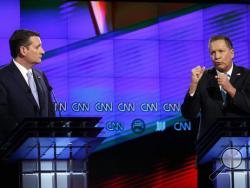FRANKLIN, Indiana (AP) — Kathy Hiel said she hadn't made up her mind to vote for Donald Trump — until the billionaire businessman's two Republican White House rivals formed an extraordinary political non-aggression pact to stop him.
"I'll have to support him now," said Hiel, an Elizabeth, Indiana, resident who designs cabinets for a home interior company.
While the political world waits to see if Texas Sen. Ted Cruz and Ohio Gov. John Kasich's alliance proves brilliant or desperate, some voters in the three states most affected applauded the move while others panned it. But many were still struggling to understand what, if anything, it will mean for them.
Kasich says he won't compete in Indiana, where Cruz is boasting he's "all-in," while the Texas senator said he will cede contests in Oregon and New Mexico to Kasich — an agreement both candidates hope will keep Trump from winning the 1,237 delegates needed to secure the GOP presidential nomination at the party's national convention in Cleveland beginning July 18.
Hiel was first in line to see Cruz at an ice cream parlor he visited in Columbus, Indiana, on Monday, and aggressively pressed the Texan as he stepped off his campaign bus on the convention's delegate-selection process.
She said she was a Ron Paul delegate to the 2012 Republican convention, and that she had doubts about Cruz because he's lately been more focused on winning delegates to Cleveland than wooing voters around the country. Then came word late Sunday of Cruz's agreement with Kasich — and Hiel said that sealed her decision.
"I never did fully trust Ted," she said.
But 28-year-old Iraq war veteran Michael Thielmeier, who attended an earlier Cruz rally in Borden, Indiana, called the agreement "smart, calculated, knowledgeable."
He said he didn't expect to see such a cooperative deal between two rivals since Cruz has built his career in the Senate and his presidential campaign around being a troublemaker who has infuriated the establishment in both parties.
Thielmeier said he still supports Cruz, because he doesn't see the pact with Kasich as an insider political move.
In Oregon, 66-year-old Craig Herman said the agreement "doesn't bother me at all."
"It's all theater," said Herman, from Oregon City. "I think they all do this for drama and put out press releases."
The deal may not hold together long term since Kasich said his supporters in Indiana should still vote for him. At a pizzeria in Greenwood, Indiana, where Cruz also stopped Monday, some voters asked him to autograph a mailer his campaign sent out before the agreement that made Kasich look soft on guns. A few attendees wondered aloud what it meant since the pair were now supposed to be friends.
Donald Trump didn't provide much clarity, blasting the deal as collusion while also gleefully saying it showed how weak Cruz and Kasich are.
Denise Lombardo, a registered nurse who attended a Trump rally Monday at a hockey arena in Wilkes-Barre, Pennsylvania, said she plans to vote during Tuesday's state primary for the first time in her life — for Trump.
"I feel that Cruz and everyone else is just jealous because he tells it like it is," Lombardo, from West Pittston, Pennsylvania, said of Trump.
Langston Bowens, a student at the University of New Mexico, said he was planning to vote for Kasich and said of the deal with Cruz: "I think we can stop (Trump) before we get to the nomination process."
Ed Kasados, a 78-year-old resident of Los Ranchos de Albuquerque, New Mexico, said he'll likely vote for Kasich, but will ultimately support whoever is the Republican nominee. He summed up the Cruz-Kasich pact in a single word: "Silly."
___
Associated Press writers Mary Hudetz in Albuquerque, New Mexico, Kristena Hansen in Portland, Oregon, and Michael Rubinkam in Wilkes-Barre, Pennsylvania, contributed to this report.

